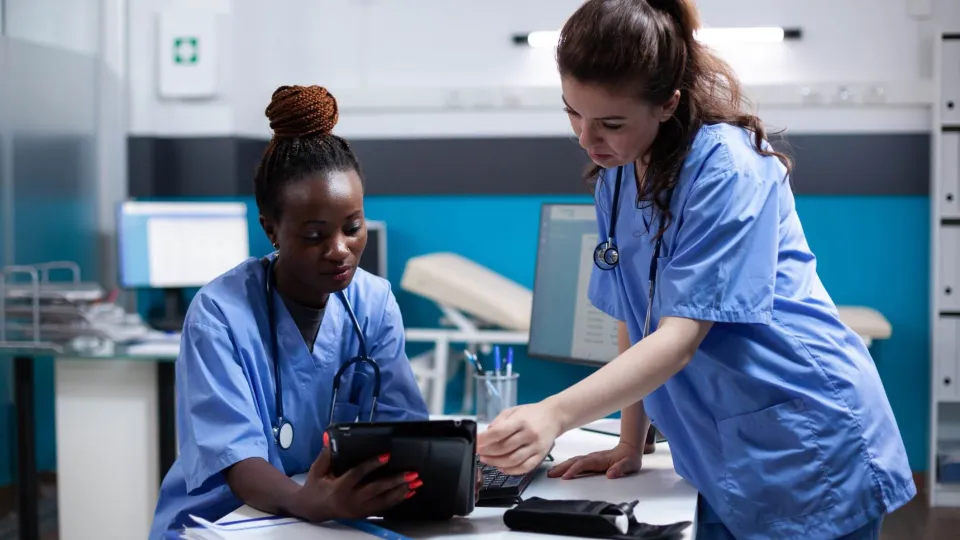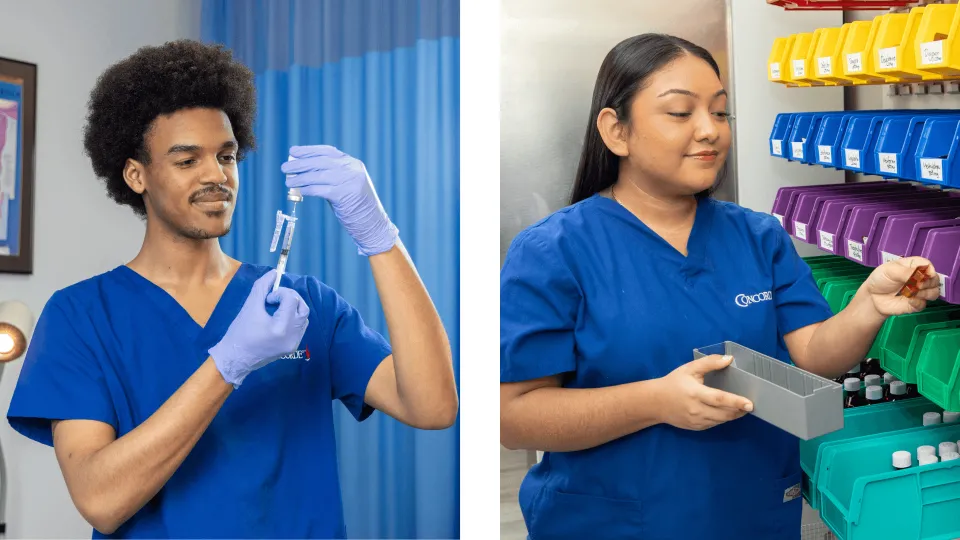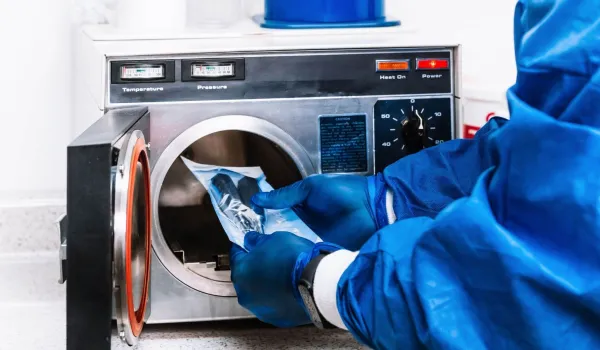
A medical assistant has a versatile role in the operation of a health care setting. These professionals need a diverse and well-rounded skill set to properly support patients, physicians, specialists, and office personnel. They develop clinical and administrative medical assistant skills for success in this growing health care field.
Clinical Skills for Medical Assistants

Medical assistants work alongside physicians. While doctors order medications, screenings, and tests, medical assistants manage much of the hands-on work. They can perform some diagnostic tests, give injections, and provide wound care. They can also assist with invasive and noninvasive medical procedures.
The scope of their responsibilities may vary by position and work location. In some states, medical assistants can give injections, draw blood, and start intravenous lines. In others, physicians or other medical personnel carry out these duties. Some of the clinical skills of a medical assistant:
- Recording patient histories
- Taking vital signs, such as pulse, blood pressure, body temperature, respiration, and pulse oximetry
- Preparing examination rooms
- Stocking and organizing supplies
- Preparing patients for examinations
- Collecting blood samples and throat cultures
- Assisting with medical examinations
- Administering medicines, injections, or eye drops
- Giving immunizations
- Starting IVs
- Removing sutures and staples
- Changing wound dressings
- Applying ice bags
- Performing noninvasive procedures such as electrocardiograms, blood glucose tests, and urine pregnancy tests
- Assisting with invasive procedures such as biopsies, incisions, drainage, colposcopies, endoscopic surgeries, and phlebotomy
Medical assistants provide essential support. They're fundamental to delivering quality patient care and enhancing the efficiency of the health care team.
Related: Understanding the Job of a Medical Assistant
Administrative Skills for Medical Assistants
Medical assistants manage many of the essential administrative duties that keep physicians' offices, clinics, and hospitals running smoothly. They have an in-depth understanding of the following skills:
- Maintaining medical records
- Taking or returning phone calls
- Scheduling appointments
- Managing patient flow
- Greeting patients and escorting them to examination rooms
- Booking laboratory services
- Setting up hospital admissions
- Calling in prescription refills
- Managing billing
- Bookkeeping
- Inventory management
- Organizing office supplies
Medical assistants combine these skills with strong technological proficiency to remain effective in an ever-evolving industry.
Related: Medical Assistant Duties
Communication and Interpersonal Skills

Medical assistants can streamline communications between receptionists and physicians because they share skills with both. They also communicate extensively with patients. Physicians develop care plans and order tests, treatments, and medications, while medical assistants often explain these plans to the patients.
A medical assistant must be proficient in medical terminology, which includes proper language for anatomy, tests, and treatments. They must also understand the Health Insurance Portability and Accountability Act and other privacy regulations so they can properly manage communications without compromising confidentiality or violating office policies.
They must have good written and verbal communication skills to perform their jobs effectively and prevent safety hazards from errors or miscommunications. Essential skills include:
- Taking verbal patient histories
- Relaying patient issues and information to physicians and specialists
- Educating patients on the proper use of mobility devices such as crutches or walkers
- Explaining procedures to patients and families
- Showing patients how to use medications properly
- Communicating with insurance companies
- Handling office correspondence
- Practicing active listening
- Facilitating teamwork and collaborating with other health care professionals
- Exhibiting empathy and compassion for patients and families
Medical assistants with a strong command of these skills can provide a positive patient experience and effective health care delivery. As a key point of contact between patients, families, health care providers, insurance companies, and front office staff, medical assistants are well-placed to streamline communications throughout the office.
Technical and Computer Skills
Today's medical assistants must have strong computer skills to successfully navigate the increasing technological complexities of the health care industry. The widespread adoption of electronic health care records was just the first step in the rapid evolution of the sector. The COVID-19 pandemic increased telehealth usage, but adoption has continued to rise in the years since. Telehealth appointments accounted for just 1% of patient visits in 2020 but 17% of visits in 2023. Wearable health technologies are revolutionizing remote monitoring and diagnostics. Predictive analytics may advance rapidly through AI integration.
Medical assistants should have a solid command of current and developing technology to adapt quickly and effectively to future developments. Their technical and computer skills and proficiencies should include:
- Inputting and managing electronic health records
- Maintaining proficiency with word processing programs, spreadsheets, and email platforms
- Using scheduling and billing software
- Navigating patient portals
- Operating common medical equipment
- Using health data tools
- Understanding medical coding
- Adapting to new technologies and software updates
Related: 12 Medical Technologies You Need To Know About in the Medical Field
Organization and Time Management Skills

Organization and time management skills are critical in health care environments. The medical assistant's organizational skills directly impact the efficiency of the other professionals they work with. Medical assistants perform many functions and interact regularly with other team members. This makes prioritization and organization abilities extremely important.
Essential time management and organization skills for medical assistants include:
- Effectively managing multiple responsibilities at once
- Prioritizing tasks appropriately
- Efficiently scheduling patients, duties, and tasks
- Identifying when patients need immediate care
- Maintaining attention to detail
- Adapting flexibly to changing priorities and emergencies
- Implementing stress management techniques
Proper organization and time management skills contribute to an effective and well-run health care environment. Medical assistants with these skills can improve patient care and positively impact the workflow in their place of employment.
Related: What Are the Job Requirements for Medical Assistants?
Developing and Improving Medical Assistant Skills
Ongoing skill development is essential in the medical assisting field. Continuous learning and professional growth may help entrants excel in their careers and command competitive job opportunities. Current and aspiring medical assistants can improve their essential skill sets through the following means.
Formal Education and Training
Medical assistants typically need a postsecondary education for employment in this field. Students can complete Concorde Career College's Medical Assistant Diploma program in as few as nine months at select campuses, while the Medical Assistant Applied Science Degree program can be completed in as few as eight months. These programs cover topics such as scheduling patients, conducting diagnostic tests, preparing samples, maintaining medical records, taking vital signs, and infection control.
Related: How Long Does It Take To Become a Medical Assistant?
Externships or Internships
Internships and externships provide essential hands-on experience. An internship offers the opportunity to gain practical experience in a real-world work environment without committing to a long-term job opportunity.
Some educational programs offer unpaid internships that give valuable experience before graduation. Post-graduation, entrants can also pursue additional externships or internships through paid and unpaid programs, depending on their needs.
Certifications
Maintaining professional certification enhances job opportunities for aspiring medical assistants. Some 96% of employers require or encourage certification for medical assistants. The National Healthcareer Association offers the Certified Clinical Medical Assistant credential. Applicants must renew this credential every two years and complete at least 10 continuing education credits in that time.
The American Association of Medical Assistants offers the Certified Medical Assistant qualification. To maintain this certification, applicants must complete 60 continuing education units every 60 months.
Continuing Education Opportunities
Continuing education opportunities help medical assistants remain at the forefront of the health care industry. The NHA offers a library of CE courses to help CCMAs maintain their certification and continually advance their knowledge. The AAMA has various programs and self-study resources to help CMAs get their necessary CEUs.
Staying Updated in the Industry
Professionals can stay updated on the health care industry by participating in medical assistant associations such as the AAMA, the American Registry of Medical Assistants, and the National Healthcare Workers Association. These organizations provide access to workshops, seminars, and publications to keep abreast of the latest research, news, and developments.
Mentorship and Feedback
Entrants might also find an experienced mentor in the health care industry to guide their career development as a medical assistant. This could be a coworker with more experience or someone they've met through a professional organization or conference. Mentorship is a powerful way to access personalized advice and coaching to support professional growth.
Building a Successful Career as a Medical Assistant
By refining this diverse skill set, you can position yourself for success as a medical assistant. Carefully balance your clinical, administrative, interpersonal, and technical capabilities for the greatest opportunities. You can start on your career path by enrolling in one of the medical assisting programs available at Concorde. These programs provide an educational foundation for a potential health care career.
Artemis Lampadaridou. (2025, February 12). Top telehealth trends for 2025 | Healthcare Transformers. Healthcare Transformers. https://healthcaretransformers.com/digital-health/current-trends/top-telehealth-trends-2025/
Medical Assistant Certification | CCMA. (n.d.). AscendBase. https://www.nhanow.com/certification/nha-certifications/certified-clinical-medical-assistant-(ccma)
Take The Next Step Towards a Brighter Future
Interested in learning more about our Medical Assistant program?
We have a Concorde representative ready to talk about what matters most to you. Get answers about start dates, curriculum, financial aid, scholarships and more!







